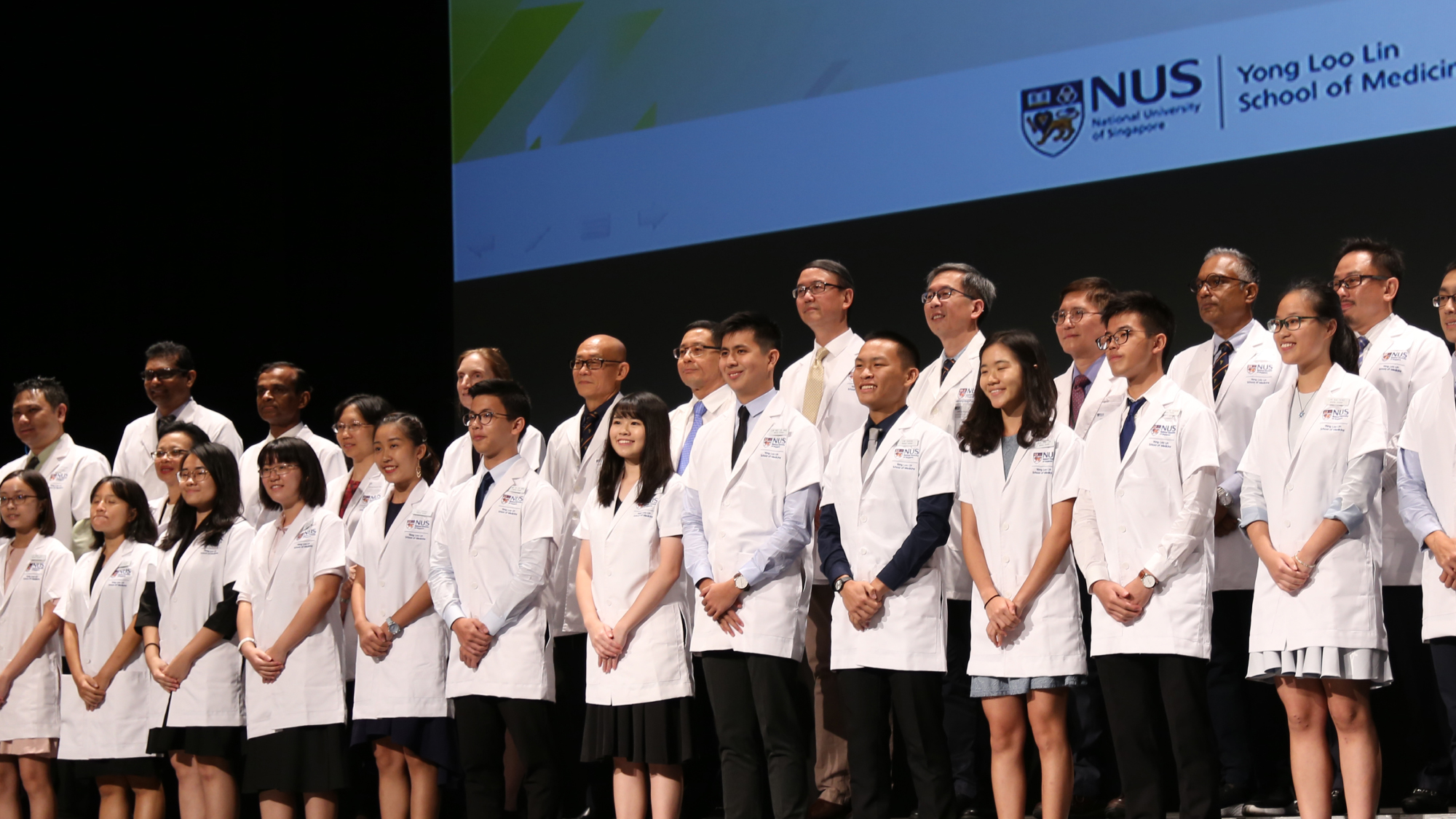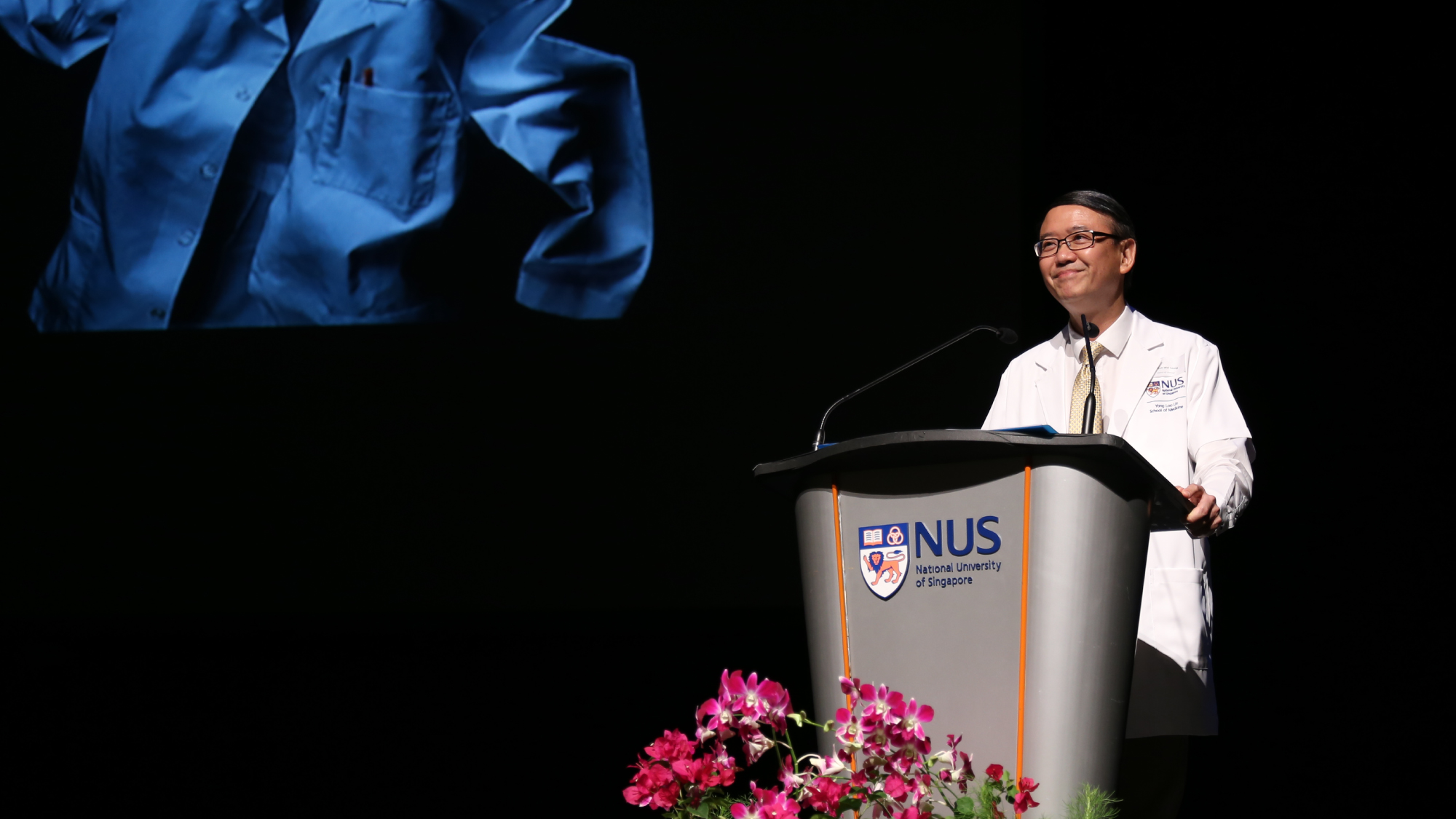Healing the Bone
Dr Goh Wei Leong, Chairman and Co-Founder of Healthserve, was the Guest of Honour at this year’s White Coat Ceremony (WCC) for first year students on 16 August 2018. This is what he told them:
It gives me great pleasure to be with you here today, on this memorable day which many of you have no doubt worked very hard for. I would like to congratulate you first, and welcome you to your first year of medical school. Well done, and welcome.
Since this day marks only the beginning of your lengthy training and education, I have been asked to give a speech that will motivate and encourage you. I hope this will encourage you today; but more importantly, down the road when you really need the encouragement, I hope that you will remember and hold this saying to heart:
I am; because we are.
Margaret Mead, a renowned American cultural anthropologist, was once asked what she considered to be the first evidence of civilisation. Her answer: a human thigh bone with a healed fracture found in an archaeological site 15,000 years old.
Why not tools for hunting or religious artefacts or primitive forms of communal
self-governance?
Mead pointed out that for a person to survive a broken femur, the individual had to have been cared for long enough for that bone to heal. Others must have provided shelter, protection, food and drink over an extended period of time for this kind of healing to be possible.
She suggested that the first indication of human civilisation is care over time for one who is broken and in need, evidenced through a fractured thigh bone that was healed.
This story is told by Ira Byock, an authority on palliative medicine, in his book The Best Care Possible: A Physician’s Quest to Transform Care Through the End of Life (Avery, 2012). In many ways the book can be understood as an extended commentary on the famous aphorism in medicine:
“To cure sometimes, to relieve often, to comfort always.”
I am a GP in the Jalan Kukoh neighbourhood at Outram. I have been practising there for 30 years, in my white coat —proudly and happily because I have always wanted to be a GP growing up.
I want to challenge you guys today, as much as we love to don our white coats as a symbol of the profession, to sometimes take them off in order to see people for who they are, and to learn from them in humility. I was challenged to take my coat off one day by my Filipino colleagues when we visited a patient, who I will refer to as Madam Tan.
Mdm Tan was an old lady; she didn’t live in a shoe, and she didn’t have many children. She had only one son, and she had just lost him in a tragic accident. She was alone, and great was her grief and distress. One day, a representative from the Agency for Integrated Care contacted me and told me Mdm Tan had requested my presence. So I brought two of my Filipino staff with me, Karl and Jana, and we paid her a home visit.
This was my perspective. After the visit, I was sufficiently impressed and even feeling proud of our local system. I felt that Mdm Tan was being well-supported in her time of need by the social worker and her family doctor, yours truly, and that she had been given clean and comfortable shelter at very little cost in a HDB rental flat.

White Coat Ceremony 2018 with Dr Goh Wei Leong as Guest of Honour (5th from right, back row).
My staff however had a completely different perspective, and it shocked me initially.
“Yes,” they said, “Mdm Tan’s flat is very nice compared to what we have in the Philippines. Even the financially able do not have housing as nice as this. But in our country, our village would have adopted this lady as our own grandmother, and she would live with us and we would care for her like our own.”
In other words, Mdm Tan wouldn’t or shouldn’t have needed professional intervention.
I learnt something very important that day from my Filipino colleagues. I learnt the importance of considering a patient beyond my professional perspective, so to speak, beyond their symptoms and diagnosis and health even.
I had donned a white coat (symbolic of the lab, what is clinical and sterile, official and efficient), but missed the deeper lesson of true healing and medicine. I boasted about the efficiency of Singapore medicine. But really, who is poorer? The Singaporean or the Filipino?
Filipinos, with their community and communal approach, would have adopted Mdm Tan as their grandmother. Community works within a covenantal relationship, not a contractual one. Covenant is about a vow, a mutual agreement, like marriage. Not a contract bound by time and ROI.
What if we, as medical professionals, move from contract to covenant? What if we see every patient as someone in our community? The migrant worker, the person with a disability, the local poor, the domestic helper and low-wage worker?
What if our culture shifts from individualism, contractual relationships and self-interest to neighbourliness and covenantal relationships? What if we practice Ubuntu?
Ubuntu is a beautiful and old South African concept. The modern dictionary defines ubuntu as “a quality that includes the essential human virtues; compassion and humanity”, but the South Africans translate it as “I am; because of you.”
In other words, I am who I am because of who you are. People are not people without other people.

Dr Goh Wei Leong — we should remove our white coats sometimes.
In 2006, Nelson Mandela was asked in an interview to explain the concept of Ubuntu. Mandela replied, “In the old days when we were young, a traveller through a country would stop at a village, and he didn’t have to ask for food or water; once he stops, the people give him food, entertain him. That is one aspect of Ubuntu, but it will have various aspects. Ubuntu does not mean that people should not address themselves. The question therefore is, are you going to do so in order to enable the community around you, and enable it to improve? These are important things in life. And if you can do that, you have done something very important.”
Another famous politician, former US President and 2007 TED Prize winner Bill Clinton, has also embraced the philosophy of Ubuntu in his philanthropic work at the Clinton Foundation. He says, “So Ubuntu — for us it means that the world is too small, our wisdom too limited, our time here too short, to waste any more of it in winning fleeting victories at other people’s expense. We have to now find a way to triumph together.” Also applying Ubuntu to politics, he told Labour delegates at a UK conference in 2006 that society and collaboration is important because of Ubuntu. “If we were the most beautiful, the most intelligent, the most wealthy, the most powerful person — and then found all of a sudden that we were alone on the planet, it wouldn’t amount to a hill of beans,” Clinton said.
When we understand Ubuntu, we realise from the inside that our own well-being is deeply tied to the well-being of others around us. It is a beautiful picture of connection, community and mutual caring for all.
When we understand Ubuntu, we will always look after the weakest in our community. And the femur would heal. We would make every effort to help those at the fringes. This is an idea of redemption too — we don’t let anyone fall through the cracks.
Here is an idea: starting with this new class of 350 first-year students. You will be together for the next five years and probably longer, as professionals in white coats. In your cohort; why not look after the weakest in your clinical groups and classes? That person struggling to understand physiology and anatomy. Or your classmate who has to work F&B banquets part-time in order to pay for his medical school fees. It is no longer about stepping on each other to get onto the Dean’s list, or scoring 100 marks while your friends fail.
Have you heard the saying that we are only as strong as the weakest link in our community? I challenge you to help take care of the weakest in your faculty. And then the weakest in the wards, and the weakest of our patients. The weakest in our society and then globally. All this will in turn shape us because of Ubuntu.
Remember: To do this and to celebrate Ubuntu, we may have to remove our white coats sometimes or allow them to be dirtied in our service of humanity and one another. So congratulations on getting your white coat today. But don’t become too attached to it, and to always remember the true purpose behind healing and medicine. And don’t forget this: Ubuntu: I am; because you are.
